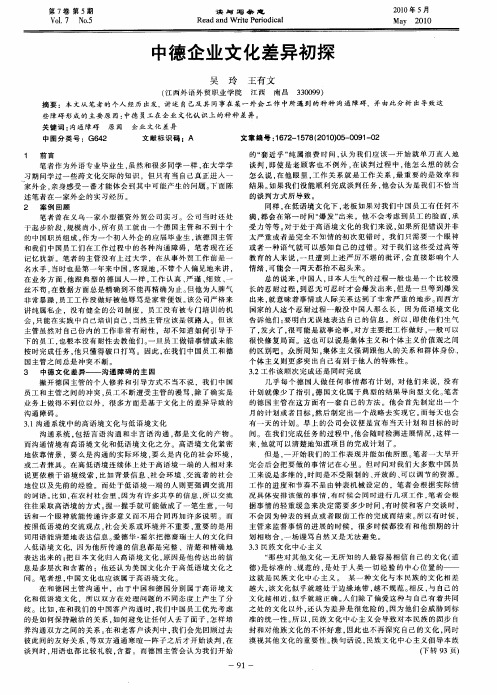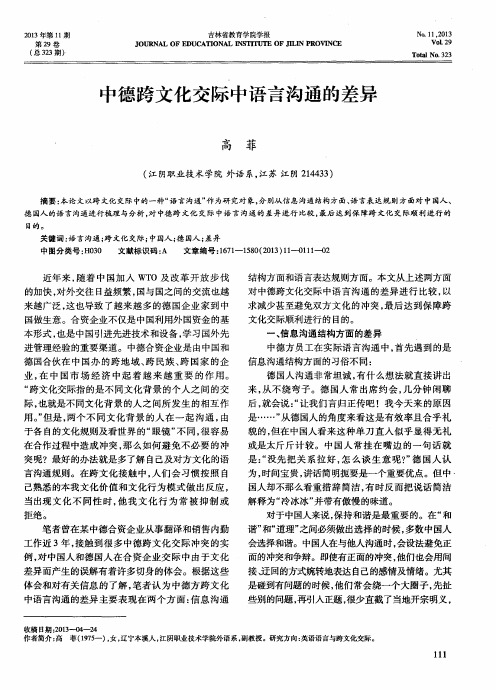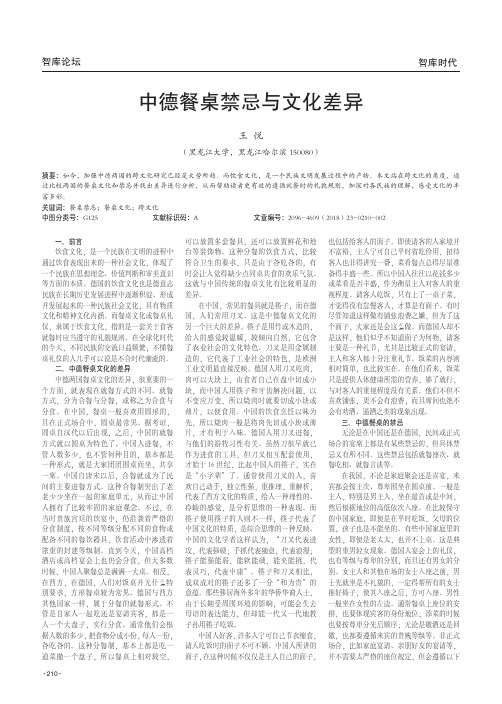中德文化差异
- 格式:doc
- 大小:2.04 MB
- 文档页数:12





浅析中德几种常见行为习惯的差异摘要:由于民族文化背景不同,导致中德人民之间存在很多常见行为习惯的差异。
只有了解这些差异。
才能更好地避免跨文化交际中的分歧,促进文化、经济的交流。
关键词:行为习惯;差异;工作纪律作为国内一家著名的变压器生产企业,我公司与德国西门子公司在几个重大项目中都有过密切合作。
作为一名翻译,在工作中我发现中德双方人员的行为习惯存在很多差异,在此就几种常见行为习惯进行阐述。
德国人和中国人最大的不同在于。
在德国人眼里任何事物不是黑就是白,谈话、做事开门见山,勿需拐弯抹角——这些性格特点与他们的语言习惯浑然一体。
作为一门复杂而精准的语言,德语的词汇在性、数、格方面的规律十分严格,语法条框的严谨和死板的特性造就了德国人严肃认真、重视纪律、守时守约、有条不紊、按部就班的特点。
一、工作表情的差异——德国:严谨、自信、不苟言笑:中国:活泼、认真、笑脸相迎对大多数德国人来说。
笑主要是表达生活之余的欢快情绪,很少用来表达其他心理状态;而对于中国人,笑除了表达热情、欢快的感情外,还可根据不同的情景来掩饰内心的不安、尴尬等,尤其在工作中,笑主要用来渲染气氛、转换话题等。
德方负责总技术指导的erbes先生。
脸部线条硬朗,比较帅气,但他给人的最直接感受却是冷峻、高傲,尽管他说起话来,并不缺乏幽默感,但脸上似乎总是看不到过多的笑容,尤其是在工作中,几乎是不苟言笑。
erbes先生是直流项目中的权威专家,在技术方面,他的言辞无不透露出极度的自信。
“工作就是工作。
我们工作时基本上保持着礼貌的距离……同事之间很难开玩笑,谈话从不涉及私人话题。
”erbes先生的这些话,诠释出德国人严谨的工作态度。
二、工作纪律的差异——德国:视遵纪守法为最高伦理原则;中国:少数人不失“以恶小而为之”的“勇气”在德国,人们视遵纪守法为最高伦理原则,凡是有明文规定的,他们都会自觉遵守;凡是明确禁止的,他们绝不会去触碰。
而中国的部分年轻人,却总爱在某些场合中耍出某种难以让人解释的“勇气”,有意无意地去挑战某些规章制度。

中德舞台剧文化对比
1.历史渊源:中德两国在舞台剧方面有着丰富的历史渊源。
德国作为欧洲文化的重要中心之一,自18世纪以来就培养了众多杰出的戏剧家和演员,如莎士比亚、歌德等。
而中国的舞台剧起源可以追溯到古代的戏曲艺术,如京剧、豫剧等。
2.艺术风格:中德舞台剧的艺术风格有所不同。
德国的舞台剧注重现实主义和表现主义风格,追求真实的人物刻画和情感表达。
而中国的舞台剧则更注重象征性和抽象性,强调舞台美学和视觉效果。
3.剧本题材:中德舞台剧的剧本题材也有差异。
德国的舞台剧更多地涉及社会和政治问题,探讨人性和社会现实。
而中国的舞台剧则更注重传统文化和历史题材,强调道德教化和人生哲理。
4.表演方式:中德舞台剧的表演方式也有所不同。
德国的舞台剧注重演员的表演技巧和真实感的呈现,强调个体的表达和情感的传递。
而中国的舞台剧则更注重团体的表演和整体的和谐,强调舞台的视觉效果和艺术构图。
中德舞台剧文化在历史渊源、艺术风格、剧本题材和表演方式等方面存在差异。
通过比较两国的舞台剧文化,可以促进不同文化之间的交流与合作,丰富舞台剧的艺术表现形式。
中德文化差异-Cultural differences between Germany and China 在洛桑的奥林匹克博物馆看到这组图,当时就和旁边的白人大妈一起笑歪了。 作者刘扬,生于北京,13岁时随父母迁居德国,后考 入柏林艺术大学。
兰色是德国Blue stands for Germany,红色是中国Red stands for China 1-一日三餐Three meals a day
在德国,早、晚餐吃凉的食物,只有中午吃热的食物;而在中国,一日三餐都是吃热的食物。 In Germany, they make cold food for breakfast, hot food for lunch only; in China, Three meals a day are all eating hot food.
2-人际关系Interpersonal relations
在德国,人与人之间的关系是点对点的,相互之间没有交叉,比较简单;而在中国人际关系是网络化的,趋于复杂化。 In Germany, the relationships between people are point to point, no cross each other, relatively simple; in China,it is a network of Interpersonal relations, and become complicated. 3-心情和天气Mood and weather 德国人不喜欢下雨天,而中国人则无所谓。 Germans do not like rainy days, while the Chinese do not care. 4-生活方式 lifestyle
德国人喜欢独居,而中国人喜欢群居。 Germans like living alone, and the Chinese people like to live in groups. 5-交通工具Transport 德国的交通工具逐渐从汽车向自行车转移,而中国的交通工具则是从自行车向汽车转变。 German Transport gradually shift from cars to bicycles, while China's Transport is changing from bicycles to cars. 6-老人的生活Life of the elderly
德国老人的生活比较闲适,可以溜溜狗;而中国老人则是在带孙子。 Comparing the German leisure life of the elderly, can yo dog; and the elderly in China is in the grandchildren. 7-自我 self
德国人比较强调自我,重视自我,乐于表现;而中国则不太善于表现自己,比较含蓄。 Comparing the German emphasis on self, paying attention to self, willing to performance; while China is not very good at the performance of their own, more subtle. 8-周末的街景Weekend street 德国人周末一般都不喜欢出去逛街;而中国人一到周末集体出动,街上人潮拥挤。 Germans generally do not like to go out shopping over the weekend; and the Chinese people for a weekend of collective action, and the streets crowded. 9-孩子 child
在德国,带孩子是父母的责任;而在中国,孩子是整个家庭老少的中心。 In Germany, child is the responsibility of parents; in China, the child is the center of the whole family young and old. 10-美丽的标准 the standard of beauty 德国人以黑为美,中国人以白为美。 German takes black as the standard of beauty , while Chinese takes white. 11-胃痛时的饮品drinks for stomache
德国人胃痛的时候,喝可乐;而中国人胃疼的时候,喝热茶。 When the Germans have stomache, they drink Coke; and when the Chinese have stomache, they drink hot tea. 12-准时punctual 德国人一般比较准时,而中国人一般习惯说几点左右,大约几点几点。 Germans tend to be more punctual, but most Chinese people used to say a few to about a few points. 13-旅游 travel
德国人出门旅游的时候,带着一双眼睛;而中国人出门旅游则是带着相机,不是在看风景,而是在拍人物写真。 Germans go out for sightseeing, with a pair of eyes; and the Chinese tourism with a camera, not looking at the scenery, but the characters in the photo shoot. 14-排队 queue 德国人比较遵守秩序,排队排成整齐的一排;而中国人则是围成乱糟糟的一团。 Germany compared to comply with the order, line up a row of neatly arranged; and China, who is surrounded by a mess. 15-淋浴的时间Shower time
德国人喜欢在白天沐浴,而中国人则喜欢在晚上洗个热水澡,然后舒舒服服的睡觉。 Germans like bathing in the daytime, while the Chinese like a hot bath at night, and comfortable sleep. 16-理想中的对方The other ideal 德国人理想中的另一半是东方人,带着草帽,留着胡须,喝着茶,用筷子吃饭;而中国人理想中的另一半则是西方绅士,用叉子吃热狗。 German ideal other half is Asian, with a straw hat, a beard, drinking tea, eating with chopsticks; and the Chinese ideal other half is the Western gentleman, with a fork to eat hot dogs. 17-意见Comments
德国人会直截了当地提出意见,而中国人总喜欢拐弯抹角地让你知道答案。 Germans to comment directly, and the Chinese people always like to beat around the bush to let you know the answer. 18-聚会Party 德国人聚会都是两三个人围在一块,而中国人则习惯全部的人围坐在一块。 German parties are two or three people around the piece, while the Chinese used to all the people sitting in one piece. 19-餐厅分贝Restaurant dB
在德国,餐厅里一般都是鸦雀无声;而在中国,餐厅一般是人声鼎沸。 In Germany, restaurants are generally silent; in China, the restaurant is usually voices. 20-处理问题 problem solveing 德国人处理问题的时候,一般会直面问题,解决问题;而在中国,人们总是倾向于绕道而行,回避问题。 Germans deal with the problem, the general will face and solve problems; in China, people tend to take a detour, to avoid problems. 21-对待新的事物Towards new things
德国人面对新事物,总是犹犹豫豫,带着怀疑的态度;而中国人却充满新奇感,比较容易接受新事物。 Germans face of new things, always hesitating, with a skeptical attitude; and the Chinese people are full of novelty, it is easier to accept new things. 22-对待愤怒Treatment of anger 德国人表面愤怒的时候,是真的愤怒了;而中国人心理愤怒的时候,表现却还堆着微笑。 German anger when the surface is really angry; and Chinese mentality in anger, the performance still piled smile. 23-时尚 fashion
在德国,以用筷子、汤匙吃饭等东方的习俗为时尚;而中国,则以刀叉等西方人的习俗为时尚。 In Germany, to use chopsticks, spoons and other eating customs of the East for fashion; and China, places the custom knife for fashion and other Westerners. 24-领导 leadership